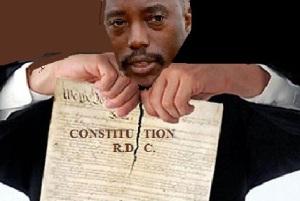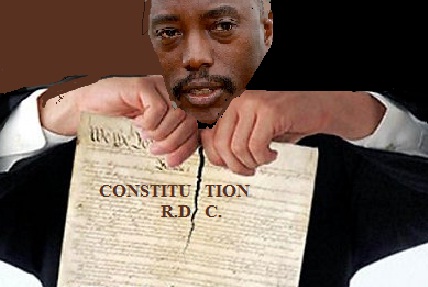----- Forwarded Message -----
From: "FSDDC democratiechretienne@yahoo.fr [Democracy_Human_Rights]" <Democracy_Human_Rights@yahoogroupes.fr>
To: "democratiechretienne@yahoogroups.com" <democratiechretienne@yahoogroups.com>
Sent: Sunday, 19 October 2014, 16:29
Subject: *DHR* Congo: President Kabila must respect the constitution and not seek a third term – By Decky Kipuka Kabongi
Congo: President Kabila must respect the constitution and not seek a third term – By Decky Kipuka Kabongi
par FreeDiomi le 19 octobre 2014
Congo: President Kabila must respect the constitution and not seek a third term – By Decky Kipuka Kabongi
There is currently one question dominating political debate in the Democratic Republic of the Congo (DRC): Will President Kabila change the constitution and seek a third term or abide by its current terms? This question is of great relevance to Congo's nascent democratic process, initiated in 2006 with the material, financial, and political support of the international community.Article 70 of the constitution limits the presidential terms to 5 years, renewable only once. Furthermore, Article 220 clearly states that the presidential term must not be subject to constitutional amendment. Given that Mr Kabila has been democratically in office since 2006, when he won the first of his two elections, he must step down at the end of 2016.Nonetheless, there are reasons to believe that Mr. Kabila is poised to change the constitution and attempt to remain in office beyond 2016. During a closed-door meeting he convened in March 2014, attended only by members of his political coalition (the presidential majority), Kabila indicated that he was inclined to remain the president beyond the constitutional terms.Moreover, there have been some political maneuvers from Mr. Kabila's allies within his coalition, which is seeking to find ways of circumventing article 220 at low political cost. The possibility of calling for a public referendum for a constitutional amendment has been put forward.If Mr. Kabila has ever thought of leaving behind an honorable and indelible legacy, abiding by the constitution is an opportunity he must seize and exit Congolese politics with his credibility intact. Kabila needs to think of what he has achieved over the last thirteen years – but the record shows that he has done little to improve the living conditions of his fellow citizens.The DRC ranks at the bottom of most indicators of socio-economic development. According to the United Nations Human Development Index (HDI), the DRC scored a value of 0.338 in 2013, almost the same as in 1980 (0.336). The situation has only improved slightly since 2001 when Mr. Kabila became president. In that year, the DRC's HDI was 0.297. It is estimated that more than 70 percent of Congolese live on less than US$ 1.25 a day.Mr Kabila has not significantly delivered on his campaign promises either. For instance, in 2006 he promised peace and improvement in the living conditions of Congolese, especially those in eastern provinces who formed his electoral base. Between 2006 and 2013, peace did not come to North Kivu and many parts of South Kivu. One needs only to recall the recurrent fighting between the FARDC, Nkunda's CNDP, M23, and other armed groups and the ensuing consequences for innocent civilians.Several armed groups continue to destabilize different areas of both South and North Kivu. Furthermore, the improved access to basic services Mr. Kabila promised to easterners has not materialized.From a governance perspective, things have not changed at all over the last 8 years. Clientelism and patrimonial practices are deeply rooted in all sectors, hindering the emergence of strong, transparent, and independent institutions. Corruption is still widespread, systemic and rampant. In 2013, the DRC ranked 154 out of 177 on the corruption perception index.The justice system too remains profoundly politicized, controlled by the regime and the wealthy, and terribly corrupt. Consequently, it cannot impartially uphold the rule of law. The politicization of the justice system has only worsened during president Kabila's two terms.Public administration remains ineffective, poorly paid, politicized, and plagued by rampant bribery and corruption. Recruitment of public servants is marked by haphazard and opaque methods. The police and the army are deeply politicized and managed in such ways that meet the interests of the regime.Politically however, Kabila has some positive achievements, which ultimately he could regard as his legacy. First, after being generously granted the presidency, following the assassination of his father in January 2001, he accelerated the peace process that ultimately led to the signing of the peace agreement in December 2002. In contrast to his father, who resisted all the pressures that led to the Congolese political dialogue, Joseph had no choice but to accept the conditions of the peace process imposed on him.The 2002 peace agreement ended the war and created conditions for a political transition from 2003 to 2006 under a power sharing arrangement. Subsequently, the first democratic elections in over four decades were held in 2006, which Mr. Kabila won.The second major point is the fragile peace recovery in eastern Congo, following the military defeat of the M23 rebellion in the fall of 2013. This was largely down to the United Nations Intervention Brigade's support of the FARDC (Congolese army) and pressure from Rwanda's western backers to end its support of the rebel group.Defeating M23 has brought relief to millions of Congolese in North Kivu who prior to this had faced terrible suffering caused by recurrent fighting between the FARDC and the successive Tutsi-led rebellions.The damage done by the armed conflict over years in eastern Congo is irreparable. Nevertheless, Mr. Kabila can count the democratic process and the end of the war in the region as the most significant milestones occurring during his administration.Whilst the economy has recorded high growth rates, only a small portion of well-connected elites and the regime's cronies are enjoying the benefits of this economic expansion, which is still driven by the mining sector and creates limited employment opportunities.Kabila's closest advisers are claiming that the president needs more time to promote development because his two terms have been hampered by armed conflicts. It is true that when Mr. Kabila came to power, violence was occurring in both Kivus and continued up until the defeat of the M23. However, this argument is misleading. One only needs to look at the poor living conditions of residents in western and central provinces of the DRC. How much improvement has been recorded in such provinces as Bas-Congo, Bandundu, Equateur, Katanga, and the two Kassai? The majority of inhabitants in the non-war torn areas are also living in indescribable poverty, lacking adequate access to water, electricity, and health services.For the sake of the Congo and its collective interest, every reasonable person in the DRC, regardless of his or her political affiliation and access to material benefits from the regime, should encourage Mr. Kabila to respect the constitution and step down at the end of 2016. Congolese elites, essentially those from Mr. Kabila's political alliance, have the opportunity to make a decisive and historic choice.Congolese elites need to find strong incentives to offer Mr. Kabila to get him out at the end of his term. Such incentives could include both political and financial elements. For instance, they might offer him presidential immunity and reasonable monetary compensation.Congo's western partners, including the US and the UK, should use their political, diplomatic and financial pressure to persuade Mr. Kabila and associates not to change the constitution. Doing otherwise will be tantamount to condoning undemocratic practices and, regrettably, ignoring all the material resources that the international community has invested in peace and democracy in the DRC.Finally, Mr. Kabila should seize the opportunity before him and make a decisive but honorable choice: not to seek a third term by changing or sabotaging the constitution and the democratic process the country embraced with his first election in 2006. He should not listen to flattering advisers who are misleading him by encouraging him to seek a third term. He should disregard those advisers trying to convince him that he should reign longer (as did the late dictator Mobutu Sese Seko.)This parallel has no value at all: Mobutu reigned in a particular international context; he mismanaged the country, and was forced out by a rebellion which Mr. Kabila was part of. There is no good political lesson to be learned from late Mobutu's handling of the Congo.If Mr. Kabila chooses to forcibly remain in power, he is very likely to cause a lot of harm by derailing the democratic process. The opposition, if determined and organized, will call on its supporters to engage in civil disobedience. If the opposition chooses the street to protest, it is very likely that Mr. Kabila will respond with a disproportionate use of force (as he did in the aftermath of the 2011 elections.) Under this scenario, many political opponents are likely to be arrested and tortured, or eventually assassinated.Diplomatically, Mr. Kabila risks isolation. It will be a surprise if the international community, which has invested billions of dollars in the Congolese democratic process, condones Mr. Kabila's actions should he not respect the constitution.Mr. Kabila and cronies may emerge as winners, but in the end they will only be losers. The reason is simple: he will not be a legitimate president, and he will create conditions for political chaos that will require unnecessary use of extra political and financial resources to bring the political situation under control.Decky Kipuka Kabongi is a Congo analyst.
Envoyé par : FSDDC <democratiechretienne@yahoo.fr>
Posted by: Samuel Desire <sam4des@yahoo.com>
| Reply via web post | • | Reply to sender | • | Reply to group | • | Start a New Topic | • | Messages in this topic (1) |
The Voice of the Poor, the Weak and Powerless.
-----------------------------------------------------------
Post message: AfricaRealities@yahoogroups.com
Subscribe: AfricaRealities-subscribe@yahoogroups.com
Unsubscribe: AfricaRealities-unsubscribe@yahoogroups.com
List owner: AfricaRealities-owner@yahoogroups.com
__________________________________________________________________
Please consider the environment before printing this email or any attachments.
---------------------------------------------------------------------------------------------------------------------
-http://www.africarealities.com/
-https://www.facebook.com/africarealities









No comments:
Post a Comment
Note: only a member of this blog may post a comment.